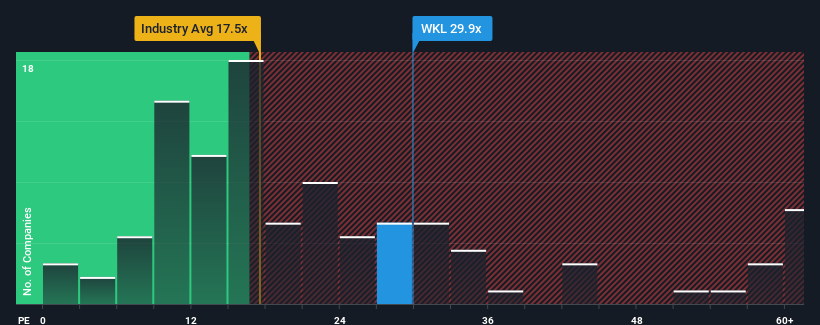- Netherlands
- /
- Professional Services
- /
- ENXTAM:WKL
Wolters Kluwer N.V.'s (AMS:WKL) Business Is Yet to Catch Up With Its Share Price

Wolters Kluwer N.V.'s (AMS:WKL) price-to-earnings (or "P/E") ratio of 29.9x might make it look like a strong sell right now compared to the market in the Netherlands, where around half of the companies have P/E ratios below 16x and even P/E's below 7x are quite common. Nonetheless, we'd need to dig a little deeper to determine if there is a rational basis for the highly elevated P/E.
With its earnings growth in positive territory compared to the declining earnings of most other companies, Wolters Kluwer has been doing quite well of late. It seems that many are expecting the company to continue defying the broader market adversity, which has increased investors’ willingness to pay up for the stock. If not, then existing shareholders might be a little nervous about the viability of the share price.
Check out our latest analysis for Wolters Kluwer

Is There Enough Growth For Wolters Kluwer?
There's an inherent assumption that a company should far outperform the market for P/E ratios like Wolters Kluwer's to be considered reasonable.
If we review the last year of earnings growth, the company posted a terrific increase of 32%. The strong recent performance means it was also able to grow EPS by 57% in total over the last three years. Accordingly, shareholders would have probably welcomed those medium-term rates of earnings growth.
Shifting to the future, estimates from the eleven analysts covering the company suggest earnings should grow by 6.1% per year over the next three years. With the market predicted to deliver 17% growth per annum, the company is positioned for a weaker earnings result.
In light of this, it's alarming that Wolters Kluwer's P/E sits above the majority of other companies. Apparently many investors in the company are way more bullish than analysts indicate and aren't willing to let go of their stock at any price. Only the boldest would assume these prices are sustainable as this level of earnings growth is likely to weigh heavily on the share price eventually.
The Final Word
Using the price-to-earnings ratio alone to determine if you should sell your stock isn't sensible, however it can be a practical guide to the company's future prospects.
We've established that Wolters Kluwer currently trades on a much higher than expected P/E since its forecast growth is lower than the wider market. When we see a weak earnings outlook with slower than market growth, we suspect the share price is at risk of declining, sending the high P/E lower. This places shareholders' investments at significant risk and potential investors in danger of paying an excessive premium.
You should always think about risks. Case in point, we've spotted 1 warning sign for Wolters Kluwer you should be aware of.
It's important to make sure you look for a great company, not just the first idea you come across. So take a peek at this free list of interesting companies with strong recent earnings growth (and a low P/E).
Valuation is complex, but we're here to simplify it.
Discover if Wolters Kluwer might be undervalued or overvalued with our detailed analysis, featuring fair value estimates, potential risks, dividends, insider trades, and its financial condition.
Access Free AnalysisHave feedback on this article? Concerned about the content? Get in touch with us directly. Alternatively, email editorial-team (at) simplywallst.com.
This article by Simply Wall St is general in nature. We provide commentary based on historical data and analyst forecasts only using an unbiased methodology and our articles are not intended to be financial advice. It does not constitute a recommendation to buy or sell any stock, and does not take account of your objectives, or your financial situation. We aim to bring you long-term focused analysis driven by fundamental data. Note that our analysis may not factor in the latest price-sensitive company announcements or qualitative material. Simply Wall St has no position in any stocks mentioned.
About ENXTAM:WKL
Wolters Kluwer
Provides professional information, software solutions, and services in the Netherlands, rest of Europe, the United States, Canada, the Asia Pacific, he United Arab Emirates, and internationally.
Second-rate dividend payer with limited growth.


